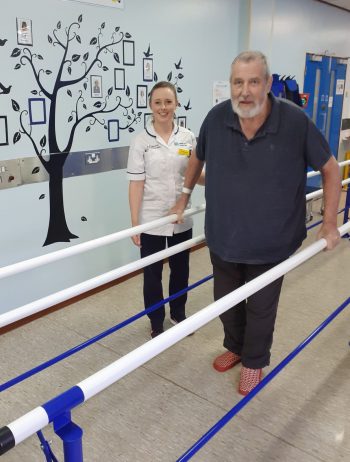25th October 2023

The Southern Health and Social Care Trust’s Non Acute Hospital Rehabilitation Team is working hard to make sure that patients get up, get dressed and keep moving in a bid to reduce ‘PJ Paralysis.’
Patients, mostly aged 65 or over, are admitted to South Tyrone and Lurgan hospitals’ rehabilitation wards for intensive support. This could be to recover from illness or injury or following an acute hospital stay.
Along with their medical and nursing care, each patient will have their own tailored support programme. This might involve physiotherapy, occupational therapy, speech and language therapy and support from the social work team.
Brian Beattie, Director of Adult Community Services for the Southern Health and Social Care Trust explains: “Research shows that people over the age of 80 can lose 10% of muscle mass for every 10 days they spend in hospital, which is the equivalent of 10 years of ageing. Along with other added risks of reduced circulation, increased delirium and infection, during a prolonged hospital stay, frail older patients also experience a decline in ability to perform routine activities.
“Some of the people we care for are in their last 1000 days of life, so whilst we want to provide the best medical care that they need in our hospitals, we will also do our very best to maintain and promote their independence and get them on the road to recovery with a prompt discharge.
“We have a very dedicated team of allied health professionals, committed to working with every patient to reach their full potential. We welcome the support of families in working with these specialists to reduce immobility while promoting cognitive function, social interaction and dignity to ensure that your loved ones can live the richest, fullest lives possible.”
#EndPJparalysis – Speech and Language Therapy
Social Interaction
Encouraging patients to get dressed and moving means they are more likely to take an active role in rehabilitation, effectively communicate their needs and enjoy social communication. Speech and Language Therapy rehabilitation may involve face to face treatment with the patient, partnering with families and training others in the environment to support good communication.
We are passionate about ensuring that, in the last 1000 days, our patients actively engage in communication and social interaction and are supported to take part in decisions relating to their care.
Meal Times Matter
Deconditioning can lead to increased confusion, reduced appetite and increased risk of swallowing difficulties, so getting patients up, dressed and moving is vitally important for eating and drinking.
We encourage patients to get out of night clothes and sit out for meals to maximise nutrition and hydration and enjoy the meal time experience. Good nutrition and hydration, promoting independence with eating and drinking and providing an environment that encourages safe and enjoyable eating and drinking has the potential to enable patients to return home sooner and have a positive impact on quality of life in their last 1000 days.
#EndPJparalysis – Occupational Therapy
Half of frail older patients in hospital experience functional decline in their ability to perform routine activities like getting washed, dressed and toileting, between admission and discharge and unfortunately up to 50% can become incontinent within 48 hours of admission.
Occupational Therapists are passionate about maximising patients’ functional ability and the ‘end PJ paralysis’ ethos is central to our work in non-acute hospitals to keep our patients independent in their last 1000 days.
Wearing day clothes rather than pyjamas enhances dignity, independence and motivation for patients. We aim to ensure that patients are doing as much as they can to maximise their independence in activities that they would normally do themselves at home, for example their own personal care, being seated while eating meals and using the bathroom rather than a bed-pan or commodes. This helps patients to feel more like themselves despite being in hospital, and helps them to be able to go home, functionally able, as quickly as possible once medically fit.
#EndPJparalysis – Physiotherapy
Studies show that wearing pyjamas can actually hinder recovery and reinforce feelings of being unwell.
Have you ever had a ‘jammie day’ and after just a few hours, started to feel restless, lethargic, stiff, sore and struggled to get up and moving again? Now think what it would feel like if you spent a week or a month in bed and in your pyjamas.
Physiotherapy staff in non-acute hospitals encourage and educate patients and relatives of the importance of getting up, dressed and moving every day. Getting up and moving has been shown to reduce falls, improve patient experience and reduce length of stay by up to 1.5 days.
Patients who are appropriately dressed, with an established routine, are more likely to actively participate in rehabilitation and be motivated to take on the therapy goals. Leaving the ward to attend our bespoke gym for rehabilitation promotes confidence, independence and recovery in preparation for discharge. We also involve families to help the patient to continue with their rehabilitation in their everyday lives.
#EndPJparalysis – End PJ Paralysis












